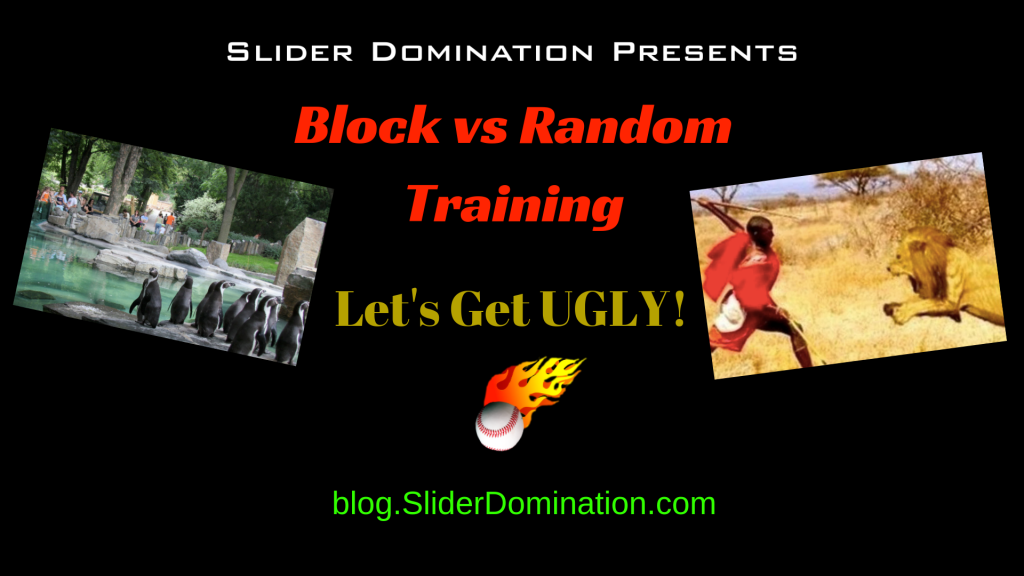 This past weekend, I attended the European Baseball Coaches Association Convention in Mulhouse, France. Yes, baseball is a thing in Europe and growing rapidly. It’s not all soccer…thankfully! I played a season in Europe and thoroughly enjoyed the role of ambassador to the game in the old world. Over the weekend, I was able to reconnect with some of the players and coaches I went into battle with and against. While additionally, making new contacts with some great baseball minds. Block vs Random Training
This past weekend, I attended the European Baseball Coaches Association Convention in Mulhouse, France. Yes, baseball is a thing in Europe and growing rapidly. It’s not all soccer…thankfully! I played a season in Europe and thoroughly enjoyed the role of ambassador to the game in the old world. Over the weekend, I was able to reconnect with some of the players and coaches I went into battle with and against. While additionally, making new contacts with some great baseball minds. Block vs Random Training
On top of that, the schedule of the weekend was filled with some high end speakers. Life changing motivators and leaders. The remarkable thing about their inspiration, is that their message goes well beyond baseball. It can be applied to any facet of life where success is desired. A consistent theme which resonated with me the most was Block vs Random Training. Of course, we have all experienced both. However, when you can fully grasp the concept of the latter, that is when things SkyRocket!!!
Block vs Random Training
Block Training

The concept of Block Training centers on the basic execution of the fundamentals required to build the necessary foundation of movements without variables. This enables the athlete to acquire the necessary repetitions towards mastering a skill. In doing so, one develops muscle memory which boosts confidence in the task. By paying attention to the body for personal feedback can create short term success.
Disadvantages
Block training does harbor on the mundane. Therefore, it can be difficult to maintain mental engagement after a while. The skills gathered through block training do not correlate to competition. Thus, learning retention is insufficient. This creates a poor transfer to game scenarios.
Block training for pitchers would be considered flat grounds and bullpen sessions. Both are essential early on in the season to gather the necessary reps going into competition. Bullpens no doubt lay the groundwork to mentally and physically execute all of your pitches consistently. However, once that is down pact, the athlete in us all is starved to be pushed. We all know that there is more out there for us to achieve. The high flyers understand there will be ugliness ahead, followed by massive results for those who stay focused and trust the process.
Block vs Random Training
Random Training

Once an athlete has his/her base, its time to get after it. A competitor has to break out of isolation. Now is the time to implement what is developed into game situations. The variables make it ugly…and that is perfectly fine.
Stress Creates Strength
In random training, the harder it is, the lower the expectations of athletes. The circumstances of random training can exceed that of an actual game. An enhanced degree of difficulty increases mental engagement. Ergo, the objective is to push the athlete both mentally and physically. As a result, there is a higher retention of learning which correlates to game situations. Because of the higher intensity in random training, execution results will be poor. Regardless, that is not to be dwelled upon seriously. Under the circumstances, one goal of intense random training is to prepare athletes to make faster decisions. In baseball, the higher up the ladder you go, the faster the game moves. It is a matter of preparing a team beyond their current season.
Push athletes out of their comfort zones and prepare them to execute in whatever insane situations may appear. This prepares them for failure. Their weaknesses will be exposed. As a result, the feedback creates the necessary sense of urgency to make the adjustment.
Disadvantages
Unfortunately, Random Training can have adverse effects on athletes who are not fundamentally sound. Whether it is a beginner or someone who is struggling and has to come back to basics and work out some mechanical flaws, getting ahead of themselves when they are not ready can create setbacks. The random training requires a lot of discipline to perform in fast paced environments. Be that as it may, when the foundation is not yet there, regressive results may occur.
“CONTEXTUAL INTERFERENCE EFFECTS WITH SKILLED BASEBALL PLAYERS”
KELLIE GREEN HALL, DEREK A. DOMINGUES, RICHARD CAVAZOS 1994
Block vs Random Training
Situational
Naturally, pitchers develop their skills in order to face hitters. Once they have sufficient command of their pitch arsenal, it will not improve unless implemented into game situations. Inter Squads are one aspect of random training. Want to dial it up even more? Make the intersquad even more interesting….and incentivized.
Instead of the traditional split squad contest, work on the situations where teams struggle.
- Have pitchers face live hitters. They stay on the mound until they walk a batter.
- When pitcher falls behind, he cannot throw a fastball.
- With 2 strikes, he must throw only fastballs.
Better yet, play a 4 inning game with high leverage situations
6th Inning Bases Loaded, 0 Outs.
Are you Up for it? How many pitchers will it take to get through the inning with minimal to zero damage?
7th inning, runner on 1st, 0 Outs.
Bunt situation.
8th Inning, 2nd & 3rd, 1 Out, Tie Game.
How can a pitcher get out of this jam and keep the game where it is, without the double play in effect?
9th Inning, 1 run lead, runner on 2nd, 0 Outs.
How to win the Game? Can the pitcher keep the ball in the infield?
If not, then:
Bottom of the 10th, Tie Game, Winning Run on 2nd.
Go Make It Happen! Enjoy the adrenaline rush of pitching on the brink of insanity to WIN!
Very simply, when the individual/team executes, they celebrate. If they falter, acceptance of the agreed upon wager commences. Running, Clean Up Duty, Buying Food, etc.
Consequently, the outcome of most games is decided in the late innings. Therefore, teams that practice random situations like these consistently, are vastly more prepared than their opponents.
Undoubtedly, Winners are created through Trial & Error. Those who handle the adversity and stand out amid the chaos, are the ones who are most deserving of having the ball when the game is on the line.
Block vs Random Training
ZOO vs JUNGLE

Dave Turgeon of the Pittsburgh Pirates organization was one of the great speakers of the event. Through his 3 part presentation, he stressed the ZOO vs the JUNGLE. The ZOO being block Training with a controlled environment. The JUNGLE is what happens come game time. When players answer the bell at 7 PM every night, they accept that the unknown can occur. They are marching out into the wild and anything can happen. The Random Training is what best prepares athletes for the JUNGLE. In closing, ask yourself, Are you prepared to be the King of the JUNGLE, or the Lion’s Dinner?
Keep Dominating!!!
About the Author
 Brad Kirsch is the Owner/Creator of Slider Domination. He is a former professional pitcher who blogs about all things Pitching. Brad has also authored the AudioBook, 7 Reasons Why YOU Should Throw a Slider. If you haven’t done so already, you can Download the AudioBook Here
Brad Kirsch is the Owner/Creator of Slider Domination. He is a former professional pitcher who blogs about all things Pitching. Brad has also authored the AudioBook, 7 Reasons Why YOU Should Throw a Slider. If you haven’t done so already, you can Download the AudioBook Here







